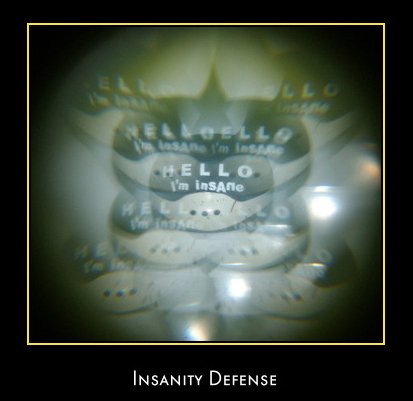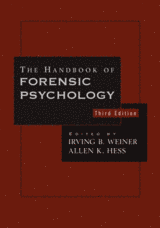|
The Forensic PsychologistThe Forensic Psychologist One of the most frequently asked questions I receive, is what does a forensic-psychologist actually do? Well we know from my preferred definition on the what is forensic-psychology page that forensic psychology relates to: That branch of applied psychology which is concerned with the collection, examination and presentation of evidence for judicial purposes’ (Haward 1981). So it's fair to state that the role of the forensic-psychologist will to a varying degree involve the provision of psychological information for the purpose of facilitating a legal decision (Blackburn 1996). Given the number of branches within psychology (social, cognitive, physiological etc) and the variety of topic areas within these branches, it's also fair to state that the nature of psychological information employed to facilitate a legal decision can vary widely. It is, therefore, very difficult to offer a specific answer to the question what does a forensic-psychologist actually do; as this will depend on the experience, background, working environment, psychological/forensic expertise etc; of the forensic-psychologist in question. However, if you want to know what forensic-psychology practice in general is really all about? Simple, watch this excellent video featuring Dr. Jeffery Kieliszewski.
The Forensic-Psychologist in Focus: Dr Stephen M PittelRather than asking what does a forensic-psychologist do, perhaps a better way to phrase the question would be, what does this particular forensic-psychologist do? I say better, because this question is much easier to answer, particularly when the forensic psychologist tells you in person; and this is precisely what Stephen M Pittel was kind enough to do. Dr Stephen M Pittel is a forensic psychologist who specializes in both civil and criminal cases that primarily involve the effects of drugs and alcohol and related mental states. His forensic work is based on a thirty year career as a pioneer in the field of substance abuse research and treatment. As Director of the NIMH funded Haight-Ashbury Research Project in the mid-1960’s and founder and Director of the Berkeley Center for Drug Studies from 1972 to 1985 he has published more than 150 scientific papers and reports on the causes, patterns of use, and effects of psychoactive drugs including LSD and related hallucinogenic drugs, marijuana, amphetamines, cocaine, heroin, PCP, alcohol and sedative-hypnotic drugs. He has also published on a wide variety of other topics including moral development, personality assessment, treatment delivery systems, aftercare, planning techniques, program evaluation, jury selection and conflict resolution. Dr. Pittel has worked directly with the treatment of substance abusers as the Director of a multi-modality treatment program in San Rafael, CA and as the Principal Investigator and Director of a NIDA funded clinical demonstration research project on the aftercare needs and community rehabilitation of drug abusers. The most recent revised version of the Drug Abuse Treatment Referral System he developed in 1970 is still considered to be the most effective technique in use for determining the most appropriate treatment for substance abusing clients. It has been used to assess the treatment needs of drug abusers by federally funded Treatment Alternative to Street Drug (TASC) Programs, the California Youth Authority and by state, county and local drug treatment and diversion programs in more than 30 states. Dr. Pittel has been a consultant to the White House Office of Drug Abuse Policy, The National Institute on Drug Abuse, the State Department Bureau of International Narcotic Matters and many other federal, state and local substance abuse treatment programs and agencies. He has worked with Law Enforcement and Criminal Justice System programs to develop and evaluate prison based substance abuse treatment and rehabilitation and drug diversion programs in California, Oregon, Delaware, and Massachusetts and in more than 200 public and private treatment programs and delivery systems throughout the country. He has also worked with the State Department Bureau of International Narcotic Matters, the World Health Organization and the United Nations Fund for Drug Abuse Programs to develop drug abuse treatment delivery systems in Pakistan and Malaysia, and to train indigenous substance abuse providers in these and other countries. Dr. Pittel maintains a database of more than 10,0000 references on the effects of psychoactive drugs. He has also maintains bibliographies on childhood and adolescent risk factors for adult substance, cognitive and other mental impairment associated with both acute and chronic substance abuse and on toxicological and other methods of identifying drug use and intoxication. Dr. Pittel has been qualified as an expert witness on the substance use and abuse, and on its relation to driving ability, violence, mental states and related matters. He has testified approximately 200 times in both civil and criminal cases in Superior Courts in California and other States, and in Federal District and Military Courts throughout the country.
The Forensic-Psychologist: Areas of InterestThis section will showcase the most interesting areas that fall within the remit of the forensic psychologist. For full details simply click on the links below.
Essential Forensic Psychologist ReadingThe Handbook of Forensic Psychology
Editorial Review This is a fully-revised and updated version of the top academic work in forensic psychology. Focussed mainly on the practical aspects of forensics, this volume provides all readers need to know to be effective practioners. Detailed sections cover both civil and criminal forensic practice; forensic report writing; treating mental illness in the incarcerated; and ethical issues. Contributors are the best-known and most respected practitioners in the field from the US and Canada. All chapters are completely revised from the previous edition, including 6 which have new authors. Forensic psychology is one of the fastest-growing specialties in the field. Its practitioners are able to avoid managed care and structured settings, and they often focus on assessment, rather than long-term treatment of clients. With the growing public interest in all things forensic, most graduate programs in psychology have added at least one course in forensic psychology over the past few years; and more established professionals are entering the field every day. See following link for more details: The Handbook of Forensic Psychology |

